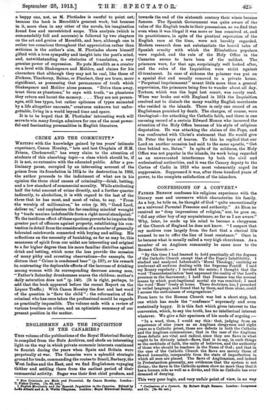ENGLISHMEN AND THE INQUISITION IN THE CANARIES.f
THIS volume of the publications of the Royal Historical Society is.compiled from the Bute Archives, and sheds an interesting light on the way in which private economic interests continued to flourish during the years when Spain and Britain were perpetually at war. The Canaries were a splendid strategic ground for trade, commanding the routes to Brazil, Barbary, the West Indies and the East, and we find Englishmen voyaging thither and settling there from the earliest period of their commercial activity. Sugar was their first chief produce, and How Criminals are Made and Prevented. By Canon Horsley. London : T. Fisher Unwin. [7s. gd. net.] t English Merchants and the Spanish. Inquisition in the Canaries. Edited by • Confessions of a Convert. By Robert Hugh Benson. London Longman, Leas Alberti sad A. B. Wallis Chapman. London : Royal Historical Society. and Co. [3s. 6d. net.]
towards the end of the sixteenth century their wines became famous. The Spanish Government was quite aware of the value of the English trade to their possessions, so we. find that even when it was illegal it was more or less connived at, and its practitioners, in spite of the piratical reputation of the English race at the time, . were not harshly regarded. Modern research does not substantiate. the horrid tales of Spanish cruelty with which the Elizabethan populace.. were regaled, and the rule of the Holy Office in the- Canaries seems to have been of the mildest. The prisoners were, for that age, surprisingly well looked after, and the rules of the Inquisition were strict against ill-treatment. In case of sickness the prisoner was put on a special diet and usually removed to a private house. "Perpetual imprisonment" meant little more than a general supervision, the prisoners being free to wander about all day. Torture, which was the legal last resort, was rarely used.
When war broke out with England in 1624 the Inquisition resolved not to disturb the many wealthy English merchants who resided in the islands. There is only one record of an Englishman punished by death. The charges, of course, were theological—for attacking the Catholic faith, and there is one amusing record of a certain Edward Monox who incurred the attention of the Holy Office because of his style of religious disputation. He was attacking the claims of the Pope, and was confronted with Christ's statement that Ile would give
St. Peter the keys of heaven. To this he replied that our Lord on another occasion had said to the same apostle, " Get
thee behind me, Satan." In spite of its mildness, the Holy Office was not popular in the islands, its work being regarded as an unwarranted interference by both the civil and ecclesiastical authorities, and it was the Canary deputy to the Cortes of Cadiz in 1813 who most vehemently urged its ' suppression. Suppressed it was, after three hundred years of power, to the complete satisfaction of the islanders.










































 Previous page
Previous page